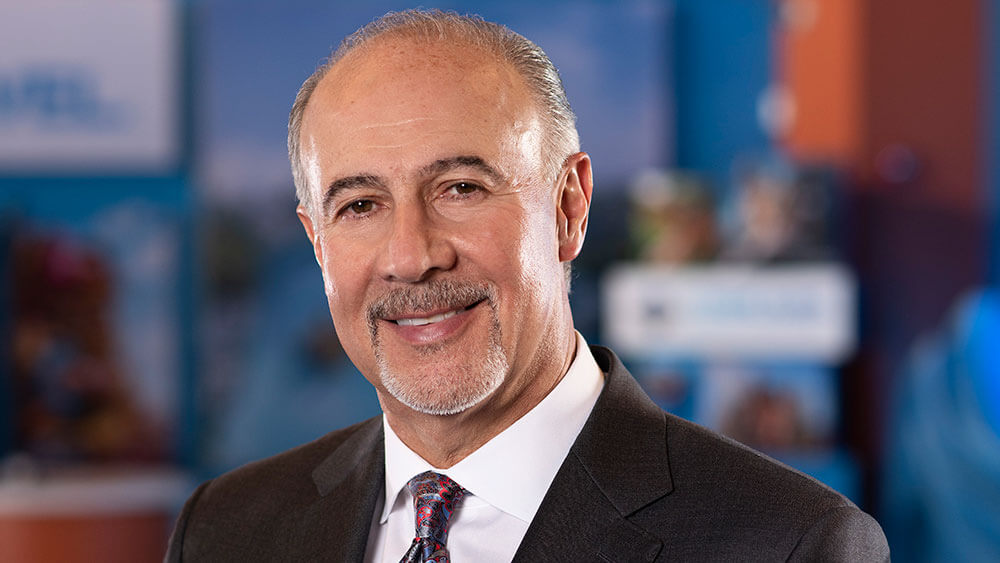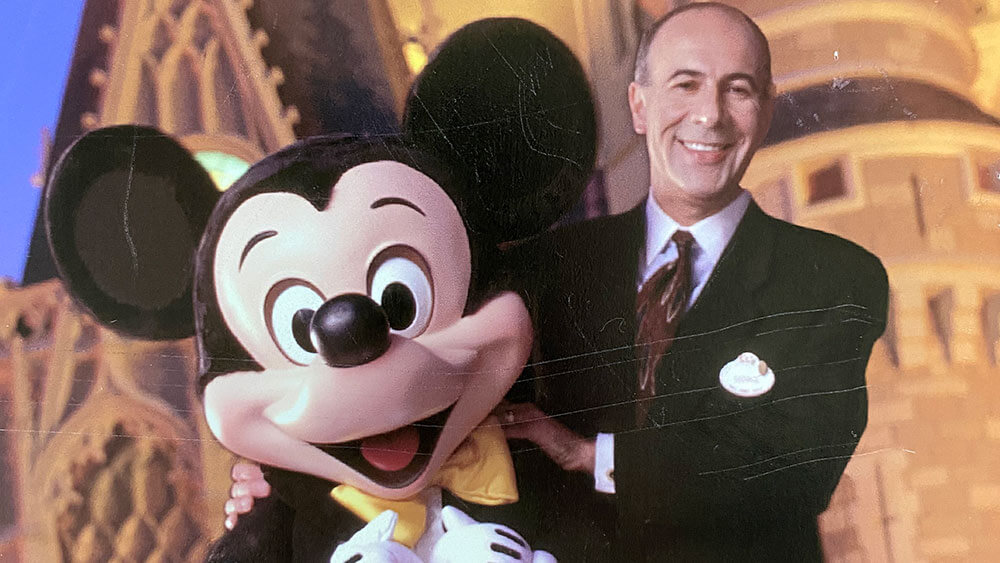
Visit Orlando CEO George Aguel has announced his retirement.
Last month, Visit Orlando CEO George Aguel announced his intent to retire after a 46-year career in hospitality and tourism that included leadership roles at Gaylord, Disney, and most recently Visit Orlando, where he led the destination to a milestone 75 million annual visitors. We caught up with Aguel to reflect on his achievements, what’s next, and his thoughts on the industry’s recovery.
Back in 2013, when you first came on board with Visit Orlando, you told Convene:
“The challenge for the meetings industry, I think, is going to be the next generation, those who are just as content texting and face-timing each other, even though they’re in the next room. I’m curious as to how much value they think they’ll get out of gathering for a single purpose. Do they need it to be motivated? Do they want to learn and network with their colleagues in that setting? Do they feel they can do it all virtually or in other forums? It’s happening today, anyway. The question is, is that generation going to push the ledger more to that side than it is today? I don’t know, but I’m intrigued.”
It’s interesting to reflect back on this because, for different reasons, we’re seeing that happen right now. How do you feel about this sudden shift to digital and the lasting impact it will have on live events?
Well they say — these days, especially in the current state — [that] those who attempt to predict what’s going to happen are on a foolhardy mission. I think everyone in the industry predicted this thing was going to last a few months. We’ve seen that prediction fail us.
This past July, we held a hybrid industry event called Together Again at the [Orange County Convention Center]. We made a significant effort [to implement] safety measures and protocols … and it tested the waters for us to understand that there is a way for our industry to adjust to the current circumstances. When we go back to live, face-to-face events, this hybrid model is going to be retained in a much more effective way than we’ve seen before.
It’s interesting how we’ve all become very accustomed to this virtual way of engaging with content — especially now, because content still, in my opinion, is king. So, what it has taught us is, [it’s not enough] to just gather — the content has to be strong, it has to be different, it has to be compelling.
But, how do you replace that feeling, that experience of being with others? I don’t think that it can be replaced. I think that smart people will figure out how to leverage both well and find a way to show the benefits [both] so that [attendees] can choose. And then … organizations will have to ensure they have the right business model to make the economics of that work for them.
I’ve been trying through these [last few] months to position Orlando as well as possible for that kind of curve. I think seeing how the industry will bounce back, and hopefully sooner than later, as I anticipate will be the case, will be gratifying to see.

George Aguel, pictured with Mickey Mouse, spent more than 23 years at The Walt Disney Company.
What have been the highlights of your career?
My induction into the [Events Industry Council’s Hall of Leaders in 2004] is certainly a highlight, and when I received [HSMAI’s Albert E. Koehl Award for Lifetime Achievement in Hospitality Marketing in 2016] — that was a big honor and an exciting moment.
Career-wise, I was one of those that didn’t make too many changes. My years opening what is today the Gaylord Opryland Resort — that property put Nashville on the convention map. We had an unusual, different product, and an incredible team to achieve that. Then spending more than 23 years at The Walt Disney Company — the richness of the experiences that I had over that period of time, doing so many jobs, so many roles, [in] so many different businesses — I think all of that really positioned me to feel comfortable in whatever I might do next.
My last career move [as president and CEO of Visit Orlando] was a very fulfilling one. It allowed me to really leverage everything I’d learned and experienced before. In this case I saw my role as really giving back to my own community — I’ve lived here for 30 years and my children grew up here. So, I think that this has been truly home.
What is the best advice you received?
Get involved in the industry. I think the underlining highlight of this industry has always been how we build strong social bonds and friendships. After that, I’d say just don’t just follow the pack. Strive to stand out. Ask yourself, “How can I be different?” Because if you do it like everybody else, you end up with the same results as everybody else.
I’ve learned, especially in my time with Disney, just how critical creativity is. [At the time], the words “meetings” and “conventions” were not very popular [at Disney], so defining the Disney brand in the meetings industry was … the biggest challenge that I had to navigate through. [Until then], I didn’t completely realize how important being creative should be in the [meetings] industry. By pushing the creative side as much as we possibly could … it helped make Disney a [bigger] name in the meetings industry.
Are there any lessons that you learned or mistakes that you made that you think were just incredibly valuable for you, that you think others could learn from as well?
Well, I find that I take nothing for granted. I think there are often times when we get a little bit too overconfident. So, to whatever degree you have the temptation of falling into that trap, I always suggest, don’t ever do that, don’t ever go there.
Have I had moments when I’ve taken my circumstances for granted? Absolutely. You get to a point where you start believing that you’re the smartest person in the room, and that then you make an error and find out you weren’t.
My greatest mentor, Jack Vaughn — who [inspired] my whole way of thinking about how to manage and lead — was the most humble man I knew. He was an absolute icon, but he never, ever, ever showed it. He put other people ahead of himself at every chance he could get. He did that for me, he put me in front of opportunities when he could have [taken them for] himself.
Make sure you identify a mentor or mentors — individuals whom you know you will learn from and … that you know have your best interests [at heart]. Those are rare and special individuals. I’m not saying that I applied [what he taught me] 100 percent of the time, as perfectly as I would’ve have liked, but I just can’t imagine how I could have had my career advance if I didn’t have that mentorship.
What will you miss the most? What’s next?
I’ll miss the great team [at Visit Orlando], and our members as well. These have been my friends for 30 years. Serving them has been something I have taken enormous pleasure in. Of course, I will miss the regular interactions with colleagues, friends, clients. But I will be replacing that, I’m happy to say, with quality time with family that I wasn’t able to have maybe as much as I could have over all these years.
My wife of 46 years — she claims she’s looking forward to spending more quality time with me. I hope she’s being honest, I’m not sure [laughs]. We were blessed with our first grandchild last year, and my youngest son is bringing us another one in October. I’m excited to hopefully be the best grandparent I can be.
This interview has been edited and condensed.
Jennifer N. Dienst is managing editor at Convene.
